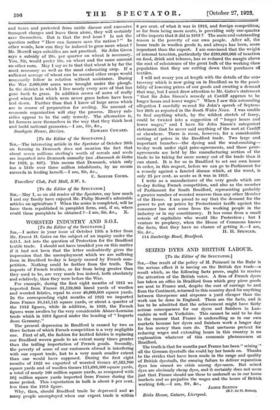WORSTED INDUSTRY AND S.O.I.
[To the Editor of the SPECTATOR.]
Sia,—I notice in your issue of October 13th a letter from Mr. Ernest H. Gates on the subject of an inquiry under the S.O.I. Act into the question of Protection for the Bradford textile trade. I should not have troubled you on this matter if it had not been that the letter undoubtedly gives the impression that the unemployment which we are suffering from in Bradford to-day is largely caused by French com- petition. Nothing could be farther from the truth. The imports of French textiles, so far from being greater than they used to be, are very much less indeed, both absolutely and relatively, than they were before the War.
For example, during the first eight months of 1913 we imported from France 81,110,963 lineal yards of woollen and worsted fabrics, equal to over 40,000,000 square yards. In the corresponding eight months of 1923 we imported from France 10,545,145 square yards, or about a quarter of the 1913 figures, while in addition, in 1923, the French figures were swollen by the very considerable Alsace-Lorraine trade which in 1913 figured under the heading of " Imports from Germany."
The present depression in Bradford is caused by two or three factors of which French competition is a very negligible
one. First of all, the fashion for knitted fabrics is replacing our Bradford woven goods to an extent many times greater than the trifling importation of French goods. Secondly, the poverty of some of our customers abroad is interfering with our export trade, but to a very much smaller extent than one would have supposed. During the first eight months of 1923 we exported of worsted tissues 47,555,700 square yards and of woollen tissues 111,693,500 square yards, a total of nearly 160 million square yards, as compared with 104 million square yards imported from France during the same period. This exportation in bulk is about 8 per cent. less than the 1913 figure.
Why, then, should Bradford trade be depressed and so many people unemployed when our export trade is within
8 per cent. of what it was in 1918, and foreign competitioni so far from being more acute, is providing only one-quartet of the imports that it did in 1913 ? The main and outstanding reason is the poverty of our own people. After all, the home trade in woollen goods is, and always has been, more important than the exports I am convinced that the weight of internal taxation, particularly the £280,000,000 of taxation on food, drink and tobacco, has so reduced the margin above the cost of subsistence of the great bulk of the working class population that they are cutting down their purchases of textiles.
I will not weary you at length with the details of the cons troversy which is now going on in Bradford as to the possi- bility of lowering prices of our goods and creating a demand that way, but I must draw attention to Mr. Gates's statement " that Sir John Simon's remedy at Cardiff appears to be longer hours and lower wages." When I saw this astounding allegation I carefully re-read Sir John's speech of Septem- ber 28th as reported in the South Wales News. I was unable to find anything which, by the wildest stretch of fancy, could be twisted into a suggestion of " longer hours and lower wages," and I have Sir John Simon's categorical statement that he never said anything of the sort at Cardiff or elsewhere. There is room, however, for a considerable cutting of prices in the Bradford trade. Two large and important branches—the dyeing and the wool-combing- to-day work under rigid price-agreements, and those price- agreements are held by the manufacturing section of the trade to be taking far more money out of the trade than it can stand. It is for us in Bradford to set our own house in order, in this respect, before we can go to Parliament for a remedy against a fancied disease which, at the worst, is only 25 per cent. as acute as it was in 1913.
I write as a manufacturer of the very goods which are to-day feeling French competition, and also as the member of Parliament for South Bradford, representing probably a greater number of worsted weavers than any other Member of the House. I am proud to say that the demand for the power to put up prices by Protectionist tariffs against the consumer has not come from the working people in the industry or in my constituency. It has come from a small coterie of capitalists who would like Protection ; but I venture to prophesy, when the House of Commons knows the facts, that they have no chance of getting it.—I am,














































 Previous page
Previous page